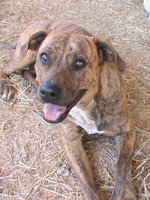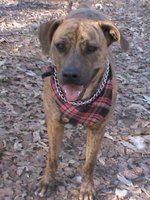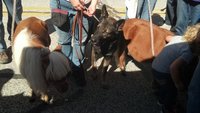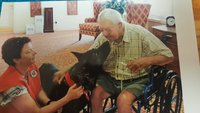mustangrooster
Songster
First off, let me introduce to you guys the dog that I have been interested in making a therapy dog.
This is the little goober. Her name is Heidi.








She is absolutely gorgeous, and she has come so far since that little helpless 4-week old puppy she used to be. She turned one this year (only a couple of months ago, actually) and she is a pitty x Bull Arab. Or so we were told. Being the runt she is a medium-sized dog and doesn't have the size of a Bull Arab. Can I just say that she is very smart too? She learned to sit at 5 weeks old. And she now knows heaps of tricks. Due to her background/history, she is a hyper and energetic dog, but she has come a long way. So, what am I talking about this for? Well......on and off for a while now I have thought about making her a therapy dog. And just recently I have been thinking about it seriously. But, I have no clue on how to go about it or even the steps in making a therapy dog. I have been searching some sites for what makes a good therapy dog, and she seems to tick most of the boxes so far. She will probably need a little more training, though. When I say therapy dog, I'm talking about visiting schools, hospitals, Retirement homes etc. But, why would I want her to specifically be a therapy dog? After all, I do have 2 other dogs. Well, I'll tell you.
She is very very kid tolerant. I'm talking like you could pinch her and she would just look at you. She is used to little kids doing everything to her and she will just lay/sit there smiling like "Yeah, what next?" Whereas the two other dogs would get grouchy if a little kid was laying on their back etc. Our oldest dog (he is around 10 next year) would also growl at little kids who are getting too playful with him. She loves playing too (but doesn't every dog? )
)
When she was really little (when she was too young to be at home alone) she would go everywhere with me, and she was a huge star. She would attract babies to little kids to adults and everybody loved her. Earlier this year when I took her to our towns show she was a huge hit there, too! People kept coming up to her to ask to pet her and I even had people asking to sit down with her for a bit. She just seems to have that effect on people. And she doesn't mind, she is a very comforting dog and is very loyal. Everybody would say how beautiful and sweet she was, oh and how funny she was.
Whilst she can be very hyper, she is always alert and always listens. She just knows when someone is down and she will come up to you, she'll look at you and just sit there quietly until you start to feel better. If you allow her she will even lick you to make you feel better. She adores people and loves getting attention, she also loves other animals. She is also very patient and will stay with you and be your listening ear for as long as you need.
However, because we are a while out of town and live rural, she is not 100% used to wearing leashes and tends to pull a bit. (As we walk with no leashes out here and is used to going where she wants on walks) She can also be a bit rough if she gets over-excited, and the little goober tends to give off little happy barks when she has a lot to say or is excited, but if she was to have a chance to become a Therapy dog, I would work on that.
I mentioned that I took her to a show not too long ago. Whilst most people loved her, I did get a couple of people shooting looks of disgust or even horror at her. And I knew it was because its clear that she has pitty in her, and there is always going to be those people who hate the breed because they think they are mean and aggressive dogs. I would love to be able to raise awareness for the pitbull breed and educate people on the breed with her as well. I imagine that could be done if we visited schools or such?
We have a very strong bond and I would just love to be able to help other people who need comfort and to also raise awareness for the pitbull breed, even if she isn't a full pitty.
I'm clueless on how to even begin to train her to be a therapy dog. Or how to even qualify for her to be a therapy dog. I need your guy's input, please. Or even thoughts/suggestions. I did find a little info about how to qualify a dog to be a therapy dog but it was for dogs in the US.....I'm in Australia.
Much appreciated,
-Mustang
This is the little goober. Her name is Heidi.








She is absolutely gorgeous, and she has come so far since that little helpless 4-week old puppy she used to be. She turned one this year (only a couple of months ago, actually) and she is a pitty x Bull Arab. Or so we were told. Being the runt she is a medium-sized dog and doesn't have the size of a Bull Arab. Can I just say that she is very smart too? She learned to sit at 5 weeks old. And she now knows heaps of tricks. Due to her background/history, she is a hyper and energetic dog, but she has come a long way. So, what am I talking about this for? Well......on and off for a while now I have thought about making her a therapy dog. And just recently I have been thinking about it seriously. But, I have no clue on how to go about it or even the steps in making a therapy dog. I have been searching some sites for what makes a good therapy dog, and she seems to tick most of the boxes so far. She will probably need a little more training, though. When I say therapy dog, I'm talking about visiting schools, hospitals, Retirement homes etc. But, why would I want her to specifically be a therapy dog? After all, I do have 2 other dogs. Well, I'll tell you.
She is very very kid tolerant. I'm talking like you could pinch her and she would just look at you. She is used to little kids doing everything to her and she will just lay/sit there smiling like "Yeah, what next?" Whereas the two other dogs would get grouchy if a little kid was laying on their back etc. Our oldest dog (he is around 10 next year) would also growl at little kids who are getting too playful with him. She loves playing too (but doesn't every dog?
 )
)When she was really little (when she was too young to be at home alone) she would go everywhere with me, and she was a huge star. She would attract babies to little kids to adults and everybody loved her. Earlier this year when I took her to our towns show she was a huge hit there, too! People kept coming up to her to ask to pet her and I even had people asking to sit down with her for a bit. She just seems to have that effect on people. And she doesn't mind, she is a very comforting dog and is very loyal. Everybody would say how beautiful and sweet she was, oh and how funny she was.
Whilst she can be very hyper, she is always alert and always listens. She just knows when someone is down and she will come up to you, she'll look at you and just sit there quietly until you start to feel better. If you allow her she will even lick you to make you feel better. She adores people and loves getting attention, she also loves other animals. She is also very patient and will stay with you and be your listening ear for as long as you need.
However, because we are a while out of town and live rural, she is not 100% used to wearing leashes and tends to pull a bit. (As we walk with no leashes out here and is used to going where she wants on walks) She can also be a bit rough if she gets over-excited, and the little goober tends to give off little happy barks when she has a lot to say or is excited, but if she was to have a chance to become a Therapy dog, I would work on that.
I mentioned that I took her to a show not too long ago. Whilst most people loved her, I did get a couple of people shooting looks of disgust or even horror at her. And I knew it was because its clear that she has pitty in her, and there is always going to be those people who hate the breed because they think they are mean and aggressive dogs. I would love to be able to raise awareness for the pitbull breed and educate people on the breed with her as well. I imagine that could be done if we visited schools or such?
We have a very strong bond and I would just love to be able to help other people who need comfort and to also raise awareness for the pitbull breed, even if she isn't a full pitty.
I'm clueless on how to even begin to train her to be a therapy dog. Or how to even qualify for her to be a therapy dog. I need your guy's input, please. Or even thoughts/suggestions. I did find a little info about how to qualify a dog to be a therapy dog but it was for dogs in the US.....I'm in Australia.
Much appreciated,
-Mustang










 I'm going to start to introduce her to a lot more noise, anything that basically makes noise I will introduce her to. She is socialized to car horns honking, and garbage clattering wouldn't bother her.
I'm going to start to introduce her to a lot more noise, anything that basically makes noise I will introduce her to. She is socialized to car horns honking, and garbage clattering wouldn't bother her. She also has selective hearing whilst on the leash and she can get a bit out of hand. So, I certainly need to work on that with her.
She also has selective hearing whilst on the leash and she can get a bit out of hand. So, I certainly need to work on that with her.